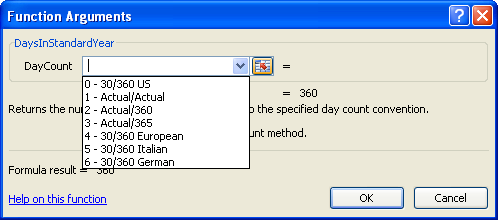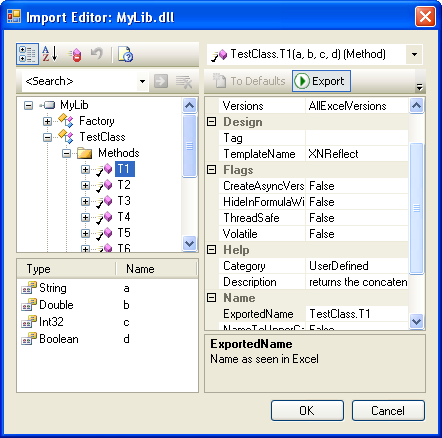What was new in XLL Plus 6.2
There were several important new features in XLL+ 6.2.
- Value lists
- Importing .NET assemblies
- RTD Object handles
- Asynchronous functions
- Logging framework
- New MFC run-time libraries
Value lists
You can now create a value list for any argument, using the Function Wizard.

Value lists can appear in 3 places:
-
If an input value is not in the value list, then an informative error message can be returned, to make it easy for the user to correct the value, e.g.:
#VALUE! Expected one of 0,1,2,3,4,5,6 for DayCount
-
A drop-down list will appear in the the Excel Formula Wizard, with the descriptions of each of the acceptable values.
-
A table describing each of the values will be inserted into the function's on-line help topic.
See Value Lists in the User Guide for more information.
Importing .NET assemblies
Using XLL+ 6.2, you can import entire .NET assemblies, and XLL+ will automatically generate add-in functions for any methods or properties that you select.
You can use Attributes in your .NET code to indicate which methods and properties you want to export, and to add any special treatment for functions or their arguments.
Alternatively, you can use the XLL+ Import Editor to select the exported methods, without changing your existing .NET code in any way.

See Importing .NET assemblies in the User Guide for more details.
RTD Object handles
We've added a new kind of object handle, implemented using RTD (Real-Time Data). This has advantages over the previous model:
- Objects can be destroyed as soon as they are no longer in use.
- Recalculation of stale objects is automatic, and does not need macros.
- Developers can customize the appearance of handles, to make them more user-friendly.
We've also added some classes to make it simple to store your objects in a cache for improved performance. The cache can be tuned using heuristics that include size of cache and age of object.
For more details see Object Handles in the User Guide.
Asynchronous functions
We've considerably improved the implementation of the asynchronous function model. It no longer needs a separate signal cell as an input, and it is faster, more robust and less intrusive.
See Asynchronous functions in the User Guide for details.
Logging framework
XLL+ (from version 6.2 onwards) contains a logging framework which helps you to write diagnostic and other information to a variety of destinations, including log files and the Visual Studio Output window.
See Logging in the User Guide for more details.
New MFC run-time libraries
A new "minimum dependencies" build of the MFC runtime libraries has been added, which allows all MFC and CRT libraries to be included within the XLL. This removes the requirement for the Microsoft MFC and CRT DLLs to be installed on a user's machine.
Version History
To see the enhancements and changes in earlier versions, use the links below.
